Completed evaluations
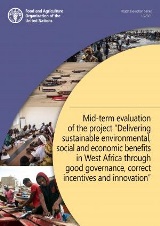
Mid-term evaluation of the project “Delivering sustainable environmental, social and economic benefits in West Africa through good governance, correct incentives and innovation”
29/10/2021
The overall objective of the project is to strengthen governance, management and value chains by the implementation of an ecosystem approach to fisheries, relevant international tools and innovative governance partnerships in Côte d'Ivoire, Cabo Verde and Senegal.
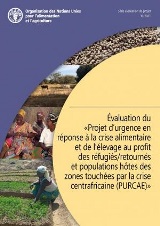
Evaluation of the "Emergency project in response to the food and livestock crisis for the benefit of refugees/returnees and host populations in areas affected by the Central African crisis (PURCAE)"
28/10/2021
The PURCAE project was implemented by the FAO Representation in Chad over the period July 2015 - February 2020. It is part of a broader program of the Government of Chad financed by the World Bank in which other agencies have participated, including the World Food Program (WFP), the International Organization for Migration (IOM) and UNICEF.
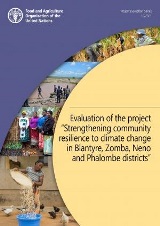
Evaluation of the project “Strengthening community resilience to climate change in Blantyre, Zomba, Neno and Phalombe districts”
28/10/2021
This report documents the evaluation findings of the project “Strengthening community resilience to climate change in Blantyre, Zomba, Neno and Phalombe districts." The project created awareness to the effects of climate change, empowering community members with knowledge and skills on how to apply gender-responsive climate–sensitive practices for increased agricultural production.
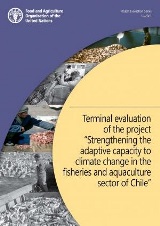
Terminal evaluation of the project "Strengthening the adaptive capacity to climate change in the fisheries and aquaculture sector of Chile"
28/10/2021
The project “Strengthening the adaptive capacity to climate change in the fisheries and aquaculture sector of Chile”, with support from the Global Environment Facility (GEF), sought to reduce the vulnerability and increase the adaptive capacity to climate change in the fisheries and aquaculture sector of Chile.
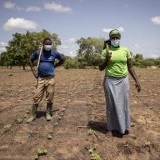
Real-time evaluation of FAO’s COVID-19 Response and Recovery Programme
20/10/2021
The COVID-19 pandemic is jeopardizing human health and disrupting the food systems that are the foundations of health. FAO designed a COVID-19 Response and Recovery Programme with the goal of proactively and sustainably addressing the socio-economic impacts of the pandemic. It aims to enable donors to leverage the Organization’s convening power, real-time data, early warning systems and technical expertise to direct support where and when it is most needed.

Terminal evaluation of “Strengthening capacity for climate change adaptation through support to integrated watershed management in Lesotho”
08/10/2021
FAO was called upon to implement sustainable land and water management practices and resource conservation in an effort to reduce the affected communities’ vulnerability while increasing their capacity to adapt to the effects of climate change.

Real-time evaluation of FAO's response to the desert locust upsurge 2020–2021: Phase II
05/10/2021
A devastating desert locust upsurge spread across parts of the Near East, the Greater Horn of Africa and South West Asia in 2020–2021, posing risks to livelihoods and food security in the region. FAO's intervention has been to curb the spread of desert locust, safeguarding livelihoods and providing recovery, and coordinating and preparing the rapid surge support.

Mid-term evaluation of the project “The coastal fisheries initiative global partnership”
01/10/2021
Many coastal fisheries are poorly managed and overexploited, resulting in suboptimal yields and lost revenue, and damage to other species and habitats. The Coastal Fisheries Initiative (CFI) is a global effort between FAO and other development partners to address these issues in a holistic and integrated way.

Evaluation of "Monitoring and Analysing Food and Agricultural policies – Phase II" (MAFAP II)
01/10/2021
Governments have turned to FAO for support in identifying and assessing options for reforming policies on food and agriculture through the “Monitoring and Analysing Food and Agricultural Policies” (MAFAP) programme. While the first phase of FAO’s efforts concentrated more on conducting policy analysis and measuring public expenditures, this second phase built on the first phase’s outcomes to support policy reforms across Southern Asia and sub-Saharan Africa.

Evaluation of the project "Australia Balochistan Agri-business Programme-Phase Two (AusABBA II)"
24/09/2021
The Australia Balochistan Agri-business Programme (AusABBA Phase II) (GCP/PAK/141/AUL) has been implemented by FAO in collaboration with the Government of Balochistan in six south-western districts with the objective to engage households in profitable agribusiness-based livelihoods and diversified strategies, and creating an enabling environment to increase their incomes, improve food security and enhance nutritional status.
